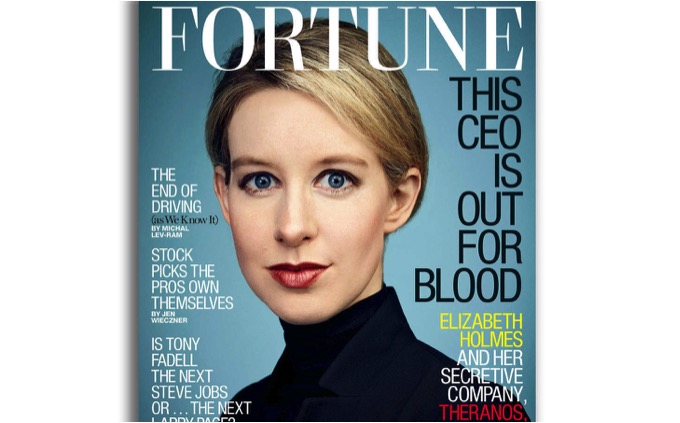
I spent the weekend researching and writing a column on a fascinating Silicon Valley startup named Theranos. Elizabeth Holmes founded the health-tech company in her Stanford dorm room in 2003, then dropped out at 19 to focus on it fulltime.
Over the next 10 years, Theranos remained enveloped in secrecy. During that time Holmes raised $400 million, most recently at a whopping $9 billion valuation.
In 2013, the company came out of stealth mode in a big way, launching a breakthrough blood test platform that could supposedly do hundreds of diagnostic tests using just a few drops of blood.
The hype was enormous. Holmes was featured in the New Yorker, on the cover of Fortune, and everywhere else. She was granted an honorary doctorate at Pepperdine. She was even compared to Steve Jobs.
Last week, the Wall Street Journal ran a front-page story disputing the efficacy and transparency of Theranos and the accuracy of its test results, among other things. The Journal’s allegations are damning and concerning.
While that sounds sort of scandalous, I think the company essentially overhyped and under-delivered. I also think it was too secretive for its own good. This is not an app or a gadget; it’s diagnostic testing of blood from real people. Lives are at stake.
In any case, Theranos has not handled the situation particularly well, to say the least, and now it’s mired in a crisis of its own making. It’s a real mess. But it happens. It doesn’t always happen quite so dramatically, but it happens a lot, and to more of us than we would like to think.
Now, I can sit here and feed you a quote about the best laid plans of mice and men. Indeed, all plans are flawed … some more than others. But then, nothing important ever goes according to plan, at least not in the real world. You know, Murphy’s Law and all that. And when things do go wrong, it’s how you respond, how you adapt, that matters.
Likewise, there’s no shortage of old proverbs like “the road to hell is paved with good intentions,” but nobody ever thinks of that when they’re in the heat of the moment and there are complex tradeoffs to be made. You simply have to make the best decision you can. Even then, the devil is always in the details.
That said, when push comes to shove — as it obviously did for Theranos — how do you make the right call?
Everyone talks about making well-informed decisions, but I think information is way overrated in that respect. When it comes to making tough choices, you’re better off relying on your instincts, experience, and humility than on knowledge.
Let me emphasize the much-underrated quality of humility in decision-making. Its antonym, hubris, is the enemy of good choices. I don’t know what Holmes and Theranos relied on in their decision-making process but I seriously doubt if humility had anything to do with it.